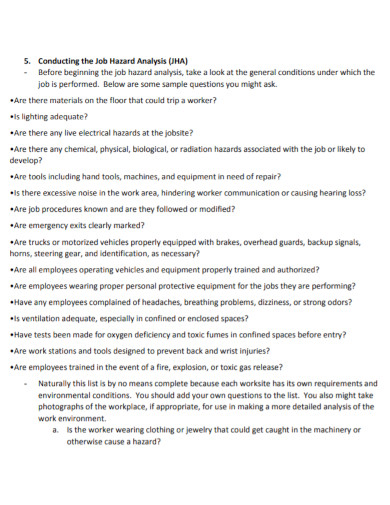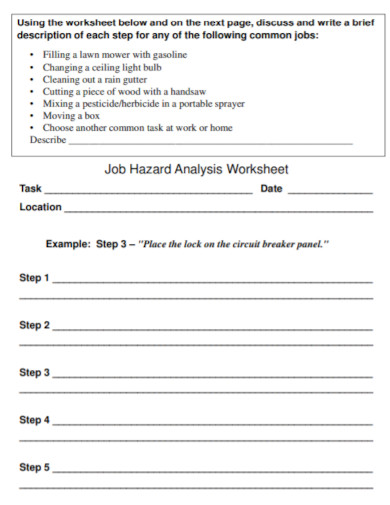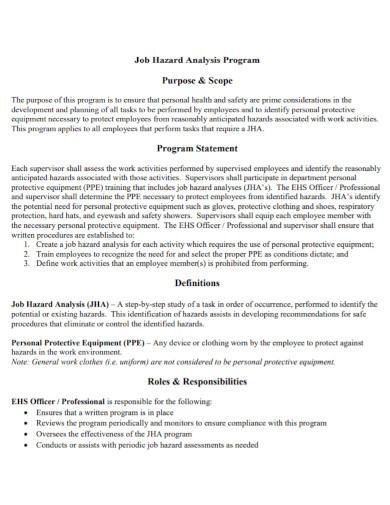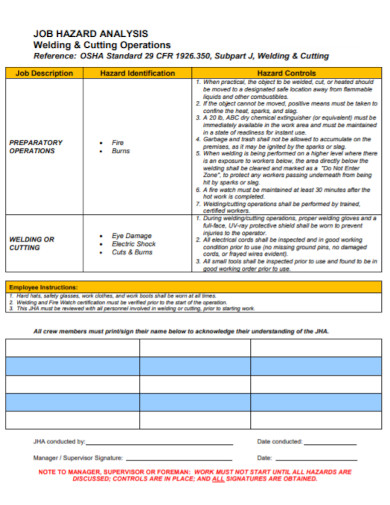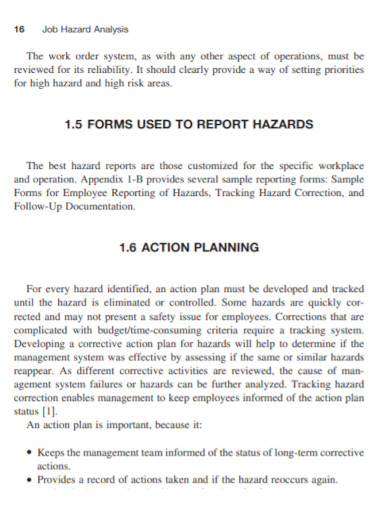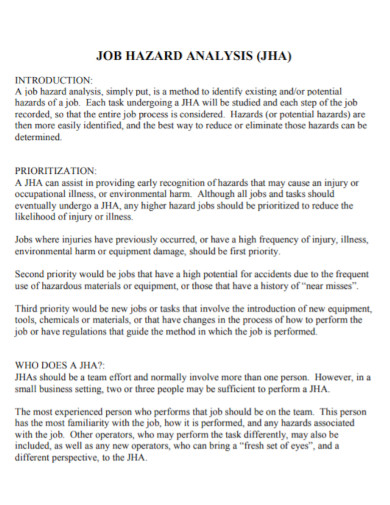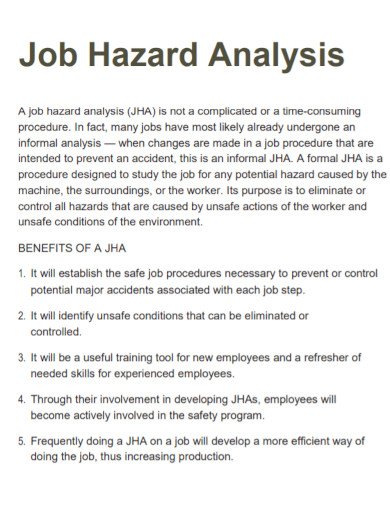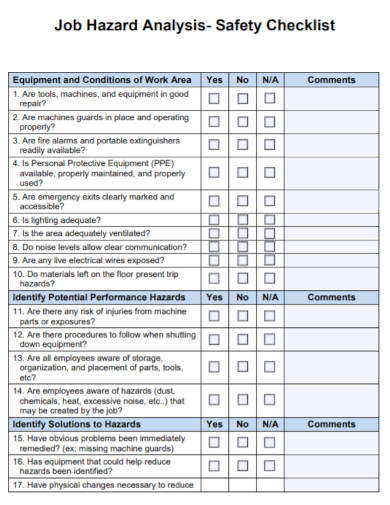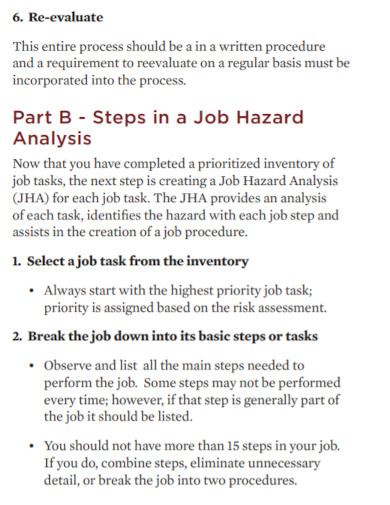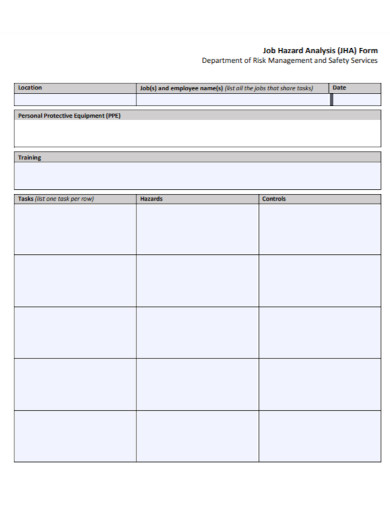10+ Job Hazard Analysis Examples to Download
In order to prevent certain incidents to happen, it is always the goal to look for preventive measures. Employees should always be protected from any types of hazards, so it is required for every company to produce an effective program that establishes injury prevention policies. There are a lot of benefits that you can get out of the prevention. Aside from the having a reduced number of people to be injured, the company will also have the chance to improve their previous prevention policies that results to reduced hazard costs and improved reputation.
10+ Job Hazard Analysis Examples
1. Job Hazard Analysis Template
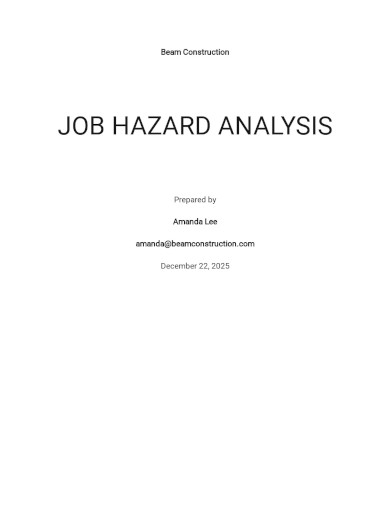
2. Health & Safety Job Hazard Analysis
3. Job Hazard Analysis Worksheet
4. University Job Hazard Analysis
5. Cutting Operations Job Hazard Analysis
6. Voluntary Job Hazard Analysis
7. Standard Job Hazard Analysis
8. Basic Job Hazard Analysis
9. Job Hazard Analysis Safety Checklist
10. Risk Assessment Job Hazard Analysis
11. Job Hazard Analysis Form
Let us start the discussion by talking about what is a hazard. A hazard is referred to something that has the potential to cause harm. We may encounter it through a particular condition or activity that may result to injury or even illness. Some examples of hazards are chemical hazards which can either be toxic, flammable or corrosive. It can also be electrical hazards, ergonomics, excavation, fall, fire or heat, mechanical, noise, radiation, accelerated mass that strikes the body, injury from coming into contact of a surface, visibility hazards, and weather phenomena. All of these hazards should have to be provided with an analysis contained for a specific job.
What is Job Hazard Analysis?
A job hazard analysis is a type of technique that aims to identify hazards even before it happens. It focuses on the employees, their work, the type of task done, the tools used and the work environment. Why is it important? It is important because an employee’s safety and health can add value to the business, your job and also to your life. It is easier to prevent injuries and illnesses by checking on your operations, job procedures and proper training of all the employees. Job hazard analysis is considered to be a larger commitment when it comes to safety and managing health.
One more thing is that when we use a job hazard analysis, we can find the findings to be more beneficial because it can be used to prevent hazards to occur in the workplace. For it to be highly effective, the company management should be able to demonstrate a full commitment to safety and health and procedures to be able to correct uncontrolled hazards. Failed to do so will lose a company’s credibility and employees will be having a hard time coming in due to these hazards that serves as a threat.
Performing Job Hazard Analysis
It is very essential for a company to involve their employees in the process of doing the hazard analysis. This will help in minimizing oversights and ensure a quality analysis. You should also have to review with your employees the history of accidents. This will allow you to think of a specific treatment or replacement that is surely effective. Ask your employees about what could be the possible hazards that they could possibly encounter in their work. If you have found out that there is an immediate danger that threats the life of an employee, take immediate action.
FAQs
What are the steps in performing a job hazard analysis?
Review and analyze each jobs and look for potential hazards, consider breaking a job into sequence to provide a direct observation regarding the situation. This will lead you to have a high level of precaution. Begin identifying the potential hazards in your work environment or each of the task, then you try to develop preventive measures that could reduce the hazards.
What does a hazard severity score means?
This identifies how severe the hazard is. It can be low severity, medium severity or high severity.
How do I identify workplace hazard?
Discover hazards by trying to answer these questions:
“What can go wrong?”
“What would be the possible consequences?”
“How will these hazards arise?”
“What are the contributing factors of these hazards?”
“How likely it will be that these hazards will occur in the workplace?”
When conducting job hazard analysis, always make sure that you comply with the safety measures and standards since it is strictly mandated. Also, do not forget t review your job hazard analysis. You may not know that there are still hazards left unnoticed during the initial analysis.



